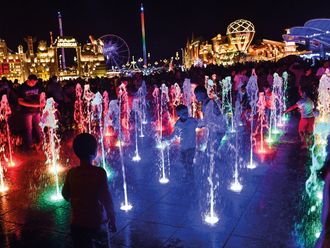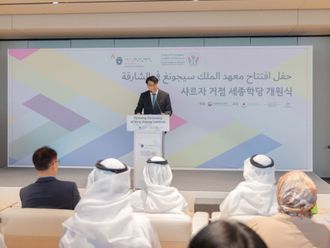"The trouble with Mount Everest is not the conditions, but the inexperienced people who try to climb it," says Martine Larroque, who will attempt to become the first UAE resident to scale the 29,028-foot Himalayan mountain next March.
The 38-year-old French-born climber, originally from Provence, seems quietly confident about her own upcoming encounter with the giant, which she will scale over a period of two months to raise funds for Medecins Sans Frontieres.
"The whole place has become far too commercial, with as many as 700 climbers staying at the base camp at any one time," she said. Larroque has little sympathy for first-time climbers who, she says, attempt to "cut their teeth" on the world's most notorious mountain.
"Many of those attempting Everest now are not proper mountaineers but novices who have paid companies a huge amount of money to take them to the top. The result is that the guides will push them beyond their capabilities because of the financial aspect. The whole business is extremely selfish. It's no wonder four people have died there so far this year."
In 1996, the peak claimed the lives of 15 people, but for Larroque, who has scaled four of the planet's highest peaks and began mountain climbing as a child, it is simply another challenge.
"I began when I was very young, and my parents always encouraged the hobby by sending me away during the summers to mountaineering schools. "As a climber, you have to realise your limits and know when to turn back. On this trip I will be climbing as far as possible without oxygen - and would love to reach the peak without using it at all, but I will not be foolhardy.
"The greatest problem with Everest is the altitude, which is why it takes two months to climb. Even at base camp people suffer from altitude sickness, which can seriously affect your ability to judge and even balance. It's also extremely cold and the food is very bad because it's dried and has to be rehydrated. You can also only consume foods that are high in calories but low in fat because in such altitudes, the body cannot digest it."
Larroque remains optimistic of her chances despite the fact that her climbing colleague, Kuwaiti national Zed Al Raffee, failed to reach Everest's peak earlier this year. Had he succeeded, he would have become the first Arab in the world to conquer the mountain.
"He began to suffer from acute altitude sickness at around 6,000 feet and was given oxygen. This didn't help and it was later discovered that he had severe swelling around his brain," she said.
"This was a physical problem that could not have been foreseen, but you must be as mentally prepared for Everest as possible.
"If you go there with troubles on your mind you won't make it. You have to be totally focused, and this is probably the hardest part."
The public can meet Larroque from 6 to 9pm at an exhibition she is holding at the Twin Towers Shopping Mall. Photographs of previous climbs, along with equipment she will be taking to Everest, are on display from 10am to 10pm until June 27 as part of Ice Surprises Week of the Dubai Summer Surprises.
French woman aims to be first UAE resident to climb Mount Everest
"The trouble with Mount Everest is not the conditions, but the inexperienced people who try to climb it," says Martine Larroque, who will attempt to become the first UAE resident to scale the 29,028-foot Himalayan mountain next March.












